Christ Church Cathedral
Pre-Concert Chat | 7 p.m. : Christiane Mariane von Ziegler, poet laureate of Leipzig, by Fiona Tinwei Lam, Vancouver’s 6th poet laureate
Artists: Jane Long, soprano; Krisztina Szabó, mezzo-soprano; Philippe Gagné, tenor; Sumner Thompson, baritone, with members of the Pacific Baroque Orchestra directed by Alexander Weimann
Christiane Mariane von Ziegler, Leipzig’s Poet Laureate (1733), vigorously defended women’s rights to improved education and literary enterprise. She was one of J.S. Bach’s esteemed librettists ( setting texts to nine cantatas) and a rare woman’s voice in the Lutheran liturgy. This programme celebrates the two Leipzig artists’ short but fruitful creative partnership.
This concert is generously supported by The Graham and Gayle Cooke Foundation, Elaine Adair, & Elaine Stevens
PROGRAMME
Johann Sebastian Bach (1685–1750)
Cantata BWV 108, Es ist euch gut, daß ich hingehe
Cantata BWV 87, Bisher habt ihr nichts gebeten in meinem Namen
INTERVAL
Brandenburg Concerto no. 5 in D major, BWV 1050
Cantata BWV 103, Ihr werdet weinen und heulen
TEXTS AND TRANDSLATIONS
Click here to read the texts and translations.
PROGRAMME NOTES
“We also bring five senses into the world as men do; understanding and reason are distributed by nature among both sexes, and memory is also granted by her as part of our dowry…” Christiane Marianne von Ziegler Romanus offered this encouragement to a friend, whose daughter showed interest in pursuing a life of learning. An outspoken advocate for women’s education and their participation in public life, Ziegler became the first female imperial poet laureate and an elected member of the Deutsche Gesellschaft, an honour comparable to the conferral of a doctoral degree. She participated in the circle of Johann Christoph Gottsched, a literary critic and professor of poetry, logic, and metaphysics at Leipzig University, who sometimes used female pseudonyms in an effort to encourage women to write and publish.
But, in 1725, when the cantor and capellmeister of Leipzig, Johann Sebastian Bach, needed emergency assistance with cantata texts for the months of April and May, Marianne von Ziegler was yet unknown as a poet. Twice widowed and having lost all four of her children, she had returned to her family home in Leipzig to devote her life to study. Perhaps it was Gottsched, or her aunt, soon to become godmother to one of Bach’s daughters, who introduced Ziegler to Bach. Still relatively new to Leipzig and working prodigiously to compose the expected weekly church cantatas, Bach found himself without libretti as the feasts of Easter, Ascension, and Pentecost were looming. The poet Andreas Stübel, with whom he had been creating an entire year’s worth of chorale-based cantatas, died suddenly on March 25, 1725. Stepping in to assist, Marianne von Ziegler wrote texts for nine of Bach’s cantatas, three of which you will hear on this program. Although Bach soon abandoned regular cantata composition and, as far as we know, never collaborated with Ziegler again, this brief moment in 1725 is remarkable. In it, a woman’s voice contributed to the public worship services (something usually prohibited), and it continues to sound through history in the unusual and creative settings Bach crafted to carry it.
Ziegler’s poetry is tightly cohesive. She follows the typical cantata libretto pattern, beginning with a biblical quotation, followed by commentary on the passage in free verse to be set as recitatives and arias, and closing with a chorale verse, an excerpt from the hymn repertory that would have been familiar to the whole congregation. In her biblical commentary, Ziegler plays with keywords from the text, sometimes incorporating additional scriptural quotes, to create a single, vivid image in each cantata – travelers reassured by the guidance of God’s Spirit in BWV 108, an anguished saint in prayer in BWV 87, and the sick heart tended by the divine physician in BWV 103. Each cantata, written for the period between Easter and Ascension, treats a text from the farewell discourse of Jesus. These are cantatas that meditate on the human experience of loss, grief, loneliness, and spiritual consolation.
Bach honours Ziegler’s carefully woven texts. Often, he forgoes the typical da capo aria structure, in which two verses of poetry are set to two contrasting musical sections, the second of which concludes with a note telling the performers to begin again da capo “from the head” of the aria, repeating the first musical section. This aria form, standard in Baroque opera, created a moment in the drama for a character to ponder their emotional responses to events, but its repetitive structure also broke the narrative flow in the interest of giving the singers a moment to demonstrate their vocal prowess with improvised decorations in the da capo section. Rather than breaking the flow of Ziegler’s texts, Bach crafts unique aria forms. In the opening aria of BWV 108, for instance, he gives each phrase its own musical idea. He follows this with another aria in two sections without the da capo repeat to allow the text to continue into the closely related following recitative.
Another striking feature of the cantatas on this program is Bach’s handling of the words of Jesus quoted in each text. Bach gives the voice of Christ a distinct timbral presence: a bass voice accompanied by rich, dark oboes d’amore. The opening chorus of BWV 103 is especially dramatic. Bach assigns joyful, skipping music to the orchestra and tortured, chromatic polyphony to the chorus to paint the text, “You will weep and howl, but the world will rejoice.” Suddenly, the voice of Christ interrupts the tumult, the bass singing in speech-like recitative, “You will be sorrowful. Yet your sorrow will be turned to joy.” The chorus responds by repeating Jesus’s words, now in an orderly fugue that incorporates elements of the orchestra’s joyful music.
As an interlude in a program of cantatas that feature surprising voices and unusual musical forms, members of PBO will perform Bach’s Brandenburg Concerto No. 5, a piece of instrumental chamber music that gives special prominence to the voice of the harpsichord, especially in the astonishing, extended cadenza of its first movement. The harpsichord was favoured by women during Bach’s day. Although the Margrave of Brandenburg, to whom Bach gifted his Brandenburg Concerti, never even opened the manuscript, this piece was championed by Sara Levy neé Itzig, a student of Wilhelm Friedmann Bach, a renowned keyboard virtuoso, and a member of the prominent Jewish family without whom the music of J.S. Bach might have completely disappeared. Sara Levy collected a large music library including many of Bach’s works, which she presented to the Sing-Akademie of Berlin. Her sister, Bella Salomon neé Itzig, gifted her grandson Felix Mendelssohn the score of an obscure masterpiece: Bach’s St. Matthew Passion. He led the Sing-Akademie in its performance in 1829. Fanny Mendelssohn wrote that the choir performed “with a fire, a striking power and also with a touching delicacy and softness the like of which I have never heard,” the public clamoured for repeat performances, and interest in Bach’s music was revived.
Creators, custodians, scholars, and champions of culture and learning, Marianne von Ziegler, Sara Levy, and Bella Salomon enriched the world with their senses, understanding, reason, and commitment to memory. Let us contribute to the revival of silenced, languishing, and forgotten women’s voices and rediscovery of their masterworks.
- Christina Hutten
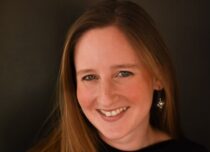
Jane Long, soprano
Hailed as a “standout” performer with “pure” and “ethereal” sound (South Florida Classical Review), Jane Long is a “clear, agile soprano” (The Georgia Straight). Vancouver, Canada, native Jane Long performs as a chamber singer, concert soloist, and recitalist. As a soloist, Jane has recently performed with the Victoria Symphony, Pacific Musicworks in Seattle, Vancouver Chamber Choir, Re:Naissance Opera, Victoria Baroque Players, chamber recitals with the St Augustine series (Vancouver), and recitals with Juno nominated pianist, Jane Coop.
Jane has had the honor of studying with renowned musicians including Emma Kirkby, Andreas Scholl, Richard Egarr, and Ellen Hargis. Some of her highlights include a staged performance of 17thCentury Italian song with Stephen Stubbs and Pacific Musicworks, a cross Canada tour of an innovative new and early music program with Arkora music collective, and performances as a soprano soloist in Early Music Vancouver’s all-women tour of Vivaldi Gloria and Magnificat, led by Monica Huggett. She sings with ensembles such as Seraphic Fire (Miami, Florida), True Concord (Tucson, Arizona), Spire (Kansas City, Missouri), Arkora (Vancouver and Toronto) and Vancouver Chamber Choir as an ensemble singer. Jane received her Bachelors of Music in Vocal Performance from the University of British Columbia and her Masters of Music in Vocal Performance from the Guildhall School of Music & Drama in London, England. She now works as a free-lance artist and lives in Washington State with her husband and three young children.
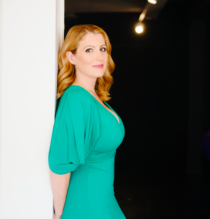
Krisztina Szabó, mezzo-soprano
Hungarian-Canadian mezzo-soprano Krisztina Szabó is highly sought after in North America and Europe as an artist of supreme musicianship and stagecraft. She is known for her promotion and performance of contemporary Canadian works. Among her many laudatory reviews, Opera Canada declared her to be an “exceptional talent” after her performance of the title role of Dido in Purcell’s Dido and Aeneas. After a performance with Tapestry Opera, the music blog, Schmopera wrote that “her instrument is one-of-a-kind and she has cemented herself as a darling of Canadian experimental music and opera…her sensibility and sensitivity to the material is truly inspiring”. In her hometown of Toronto, she has been nominated twice for a Dora Award for Outstanding Female Performance. Krisztina has recently been appointed Assistant Professor of Voice and Opera at the University of British Columbia School of Music.

Philippe Gagné, tenor
A specialist in the baroque repertoire, Philippe Gagné has performed at many of the world's great venues and with many renowned ensembles including: Les Talens Lyriques, Tafelmusik, Les Violons du Roy, Arion Orchestre Baroque, Ensemble Masques, L’Orchestre symphonique de Québec, Les Délices, and L’Harmonie des saisons. Philippe is a highly recognized interpreter of the French Baroque repertoire, as well as of the music of J. S. Bach. This past February he travelled to France at the invitation of the Ensemble Masques to participate in the Festival La Folle Journée de Nantes to perform a selection of French baroque opera arias. He then made two appearances as part of the Complete J.S. Bach cantatas - Year 8 in Bourgie Hall of the Montreal Museum of Fine Arts; first with the Harmonie des Saisons at the end of February, then at the end of March with the Orchestre Métropolitain under the direction of Yannick Nézet-Séguin.
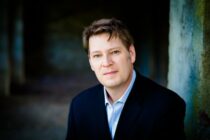
Sumner Thompson, baritone
Praised for his “elegant style” (The Boston Globe), Sumner Thompson is one of today’s most sought-after baritones. He has performed across North America and Europe as a soloist with renowned ensembles such as Concerto Palatino, Tafelmusik, Apollo’s Fire, Les Boréades de Montréal, Les Voix Baroques, the King’s Noyse, Mercury Baroque, and the symphony orchestras of Charlotte, Memphis, and Phoenix. Recent highlights include Monteverdi’s Vespers of 1610 and the new Vespers of 1640 with the Green Mountain Project; Buxtehude’s Membra Jesu Nostri with Les Voix Baroques and Houston’s Mercury Baroque; Mozart’s Requiem at St. Thomas Church in New York City; a tour of Japan with Joshua Rifkin and the Cambridge Concentus; and Britten’s War Requiem with the New England Philharmonic. He most recently appeared with EMV last year in From War to Peace: Heinrich Schurz and His Time (November) and Festive Cantatas: JS Bach Magnificat (December).
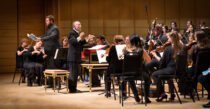
Pacific Baroque Orchestra
The ‘house band’ of Early Music Vancouver, The Pacific Baroque Orchestra (PBO) is recognized as one of Canada’s most exciting and innovative ensembles performing “early music for modern ears.” Formed in 1990, the orchestra quickly established itself as a force in Vancouver’s burgeoning music scene with the ongoing support of Early Music Vancouver. In 2009, PBO welcomed Alexander Weimann as Director. His imaginative programming, creativity and engaging musicianship have carved out a unique and vital place in the cultural landscape of Vancouver.
PBO regularly joins forces with internationally-celebrated Canadian guest artists, providing performance opportunities for Canadian musicians while exposing West Coast audiences to a spectacular variety of talent. The Orchestra has also toured throughout BC, the northern United States, and across Canada. Their 2019 East Coast Canadian tour with Canadian soprano Karina Gauvin culminated in a critically acclaimed album, Nuit Blanches, released by Atma Classique.
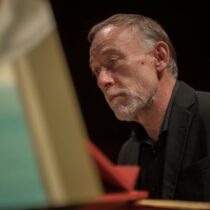
Alexander Weimann, music director
Alexander Weimann is one of the most sought-after ensemble directors, soloists, and chamber music partners of his generation. After travelling the world with ensembles such as Tragicomedia, Cantus Cölln, the Freiburger Barockorchester, Gesualdo Consort and Tafelmusik, he now focuses on his activities as Music Director of the Pacific Baroque Orchestra in Vancouver, Music Director of the Seattle Baroque Orchestra, and regular guest conductor of ensembles including the Victoria Symphony, Symphony Nova Scotia, Arion Baroque Orchestra in Montreal and the Portland Baroque Orchestra.
Alex was born in Munich, where he studied the organ, church music, musicology (with a summa con laude thesis on Bach’s secco recitatives), theatre, mediæval Latin, and jazz piano, supported by a variety of federal scholarships. From 1990 to 1995, he taught music theory, improvisation, and Jazz at the Munich Musikhochschule. Since 1998, he has been giving master classes in harpsichord and historical performance practice at institutions such as Lunds University in Malmö, the Bremen Musikhochschule, the University of California (Berkeley), Dartmouth College (New Hampshire), McGill University, Université de Montréal, and Mount Allison (New Brunswick). He now teaches at the University of British Columbia and directs the Baroque Orchestra Mentorship Programme there. He has received several JUNO and GRAMMY Award nominations – most recently, for the album Nuit Blanches with the Pacific Baroque Orchestra and Karina Gauvin.


